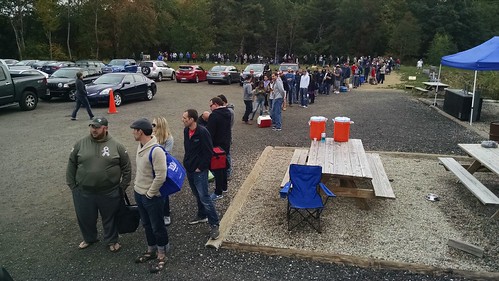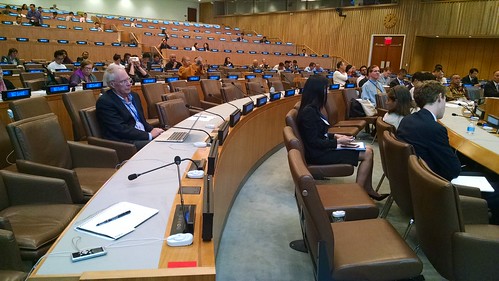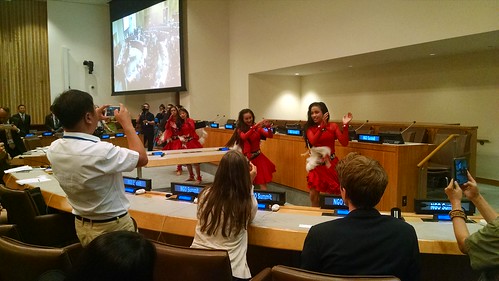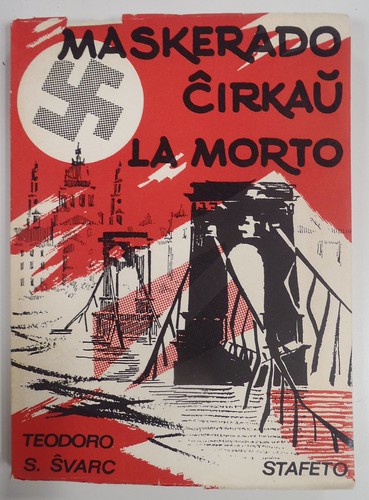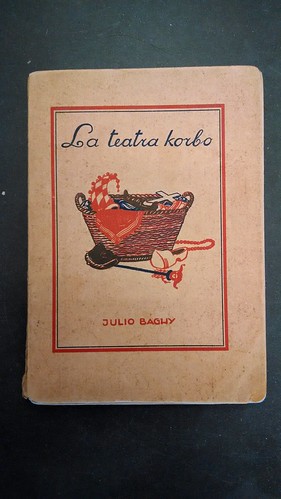Jen artikoleto kiun mi verkis antaŭ du jaroj cele al Esperanto-revuo. Mi sendis ĝin — kaj eĉ alparolis la redaktoro pri ĝi ĉe la UK — sed ĝi neniam aperis. Pro tio ke mi verkis novan afiŝon pri tio kion mi faros por libroj indas, tamen, ke oni trovu la informon pri la kolekto nun, do mi afiŝas ĝin ĉi tie.
En frua decembro 2014, mi ricevis telefonvokon de filo de maljuna samideano Allan C. BOSCHEN por sciigi min ke la patro translokiĝis por esti pli proksima al parencoj. Li diris ke li traktas la posedaĵojn de sia patro kaj serĉas hejmon por kelkaj skatoloj da Esperantaj libroj. Li demandis ĉu mi povus akcepti la librojn por ke oni uzu ilin. Mi konsentis. Post kelkaj tagoj, li alvenis dum la frua vespero kaj ni enportis ok skatolojn da libroj en mian domon.
Antaŭ kelkaj jaroj, mi korespondis kun Humphrey TONKIN kiu ekserĉis estontan hejmon por sia biblioteko postmorte. Li demandis min pri la specialan kolekton ĉe Universitato de Masaĉuseco Amherst (kie mi estas fakultatano). Mi kontaktis la arĥiviston ĉe mia loka universitato, Robert S COX, kiu pretis akcepti la kolekton. Mi proponis tion al s-ro TONKIN, sed li decidis direkti sian bibliotekon aliloken. Mi bedaŭris la perdon ĉar mi tre volis havi tian kolekton proksime sed persone havas nek monon nek tempon nek lokon en la domo nek kapablon nek emon por organizi ĝin mem.
Kiam mi ricevis ĉi tiujn skatolojn, mi decidis kontakti s-ro COX denove. Li tuj memoris kaj ankoraŭ interesiĝis pri Esperanto. Montriĝas, ke li interesiĝas pri lingvoj ĝenerale kaj artefaritaj lingvoj speciale. Fakte, li entuziasmas pri Esperanto kaj same ege bedaŭris la perdon de la antaŭa biblioteko. Ni interŝanĝis kelkajn mesaĝojn. Post unudu tagoj, ni aranĝis la transdonon de la skatoloj al li kaj la biblioteko oficiale akceptis ilin kiel la unua paŝo al starigi kolekton de Esperantaj libroj.
Post kelkaj tagoj plu, mi vizitis la bibliotekon por esplori kio estis en la skatoloj. Mi tre intence ne entreprenis tion dum mi havis la skatolojn. Mi vere ne volas akiri pli da libroj kaj mi timis ke, se mi scios kiuj estas la libroj, mi sentos teruran tenton alpreni kelkajn el la libroj por mi mem. Sed mi ege kuriozis kio estas en la skatoloj.
Intertempe, s-ro COX elprenis la librojn, forigis la duoblajn ekzemplerojn, kaj aranĝis la unuopajn sur bretoj. Per interkonsento kun la familio, ĝi nomiĝas la Allan C. BOSCHEN Esperanto-Kolekto.
Montriĝas ke la kolekto estas sufiĉe interesa. S-ro BOSCHEN kolektis dum longa Esperanta vivo kaj kelkaj libroj ankaŭ venas de la biblioteko de John L LEWINE. D-ro LEWINE ekesperantiĝis en 1920, estis tre aktiva dum la tuta vivo, translokiĝis al okcidenta Masaĉuseco en sia emeritiĝo, kaj mortis en 1982. Mi memoris ke s-ro BOSCHEN kaj d-ro LEWINE estis konatoj kaj, supozeble, post la morto, li ricevis liajn librojn.
Entute estas 6 metroj da libroj (ambaŭ flankoj de bretaro) inter ili multaj interesaj ekzempleroj. Kompreneble estis diversaj lernolibroj kaj vortaroj -- s-ro COX speciale interesiĝis pri unudu vortaroj kaj libroj pri Ido. Kompreneble estas ankaŭ multaj esperantologiaj libroj ekz. la kolektitaj verkoj de Zamenhof, kaj diversaj movadaj eldonaĵoj, jarlibroj, ktp. Sed estas ankaŭ dekoj da libroj de literaturo kaj poezio, speciale el la Budapeŝtaj kaj Skotaj skoloj: AULD, BAGHY, BOULTON, KALOCSAY, kaj multaj aliaj. Tradukita literaturo abundas inkluvize belege bindita ekzemplero de "Dia Komedio". Estas ankaŭ diversaj sciencaj libroj, de NEERGAARD kaj aliaj, kaj diversaj terminologiaj tekstoj. Ankaŭ multaj kulturaj tekstoj pri diversaj mondpartoj, ekz "Aŭstralio: Lando kaj Popolo" de 1927. Mi speciale ĝojis vidi tre bone konservitan ekzempleron de unua eldono de "Maskerado Ĉirkaŭ la Morto" de Teodoro ŜVARC. Baldaŭ, la arĥivistoj faros liston de la libroj laŭ aŭtoro.
La kolekto estos konservita. Homoj ne povos rekte prunti de ĝi, sed povos viziti ĝin. Kaj peti, laŭeble, ke oni faru kopiojn por esploraj celoj. Mi esperas ke studentoj interesiĝos pri Esperanto kaj esploros ĝin. La kolekto povas fariĝi la komenco de Esperanto-agado en la regiono. La kolekto neniam estos same granda kiel la Esperanto-muzeo en Vieno, sed estas neniu simila biblioteko en la regiono. Ĝi estas komenco.
Sekve, s-ro COX volas kreskigi la kolekton. Li jam aĉetis kelkajn librojn por pligrandigi la kolekton kaj bonvenigas kontribuojn. Li ankaŭ pripensas novajn akirojn, inkluzive la plenan verkaron de Zamenhof.
La kolekto jam kreskiĝas. Kelkaj lokaj esperantistoj jam kontribuas interesajn librojn, speciale librojn kiuj bezonas konservadon. Inter ili troviĝas subskribitan ekzempleron de La Teatra Korbo fare de Julio Baghy. Ĝi estis presita en 1934 per acida papero kaj la paĝoj ne-eviteble fariĝas frakasiĝemaj. Estas bone ke la libro oni prizorgos por ke ĝi restu havebla al la publiko, se nur por viziti. Ĉio estas bonvena, tamen. S-ro COX speciale ekscitiĝis pri kuirlibro kiu estis inter la lastaj aldonaĵoj.
Kiam mi ekserĉis hejmon por la kolekto, mi kontaktis Esperanto-USA kaj lernis ke ili dum kelkaj jaroj akceptas la bibliotekojn de forpasintoj, sed nur por disvendi ilin. Mi certas ke ni povas fari pli bone.
Antaŭ tridek jaroj, Aaron LANSKY, studento pri la Yida lingvo, konstatis ke la gefiloj forĵetas la librojn de siaj Yidaj gepatroj. Li decidis organizi Yidan Libro-Centron por konservi ilin. Komence, ili povis nur elpreni ilin de la rubujo, sed nun ili havas modernan esplorcentron por pristudi la librojn kaj klerigi la publikon pri la Yidaj lingvo kaj kulturo.
Mi ne trompas min ke pri Esperanto ni povus fari same. La esperantistaro estas nek tiel granda nek havas tiel profundajn poŝojn. Samtempe, ni ne simple rezignu ke ĉion forpasu senlukte. Ni havas amikon ĉe la arĥivon de UMass Amherst. Ili volas konservi ne nur librojn sed ankaŭ revuojn, ĵurnalojn, korespondadon, kaj ĉiajn Esperantaĵojn. Mi invitas la esperantistaron subteni nin per mono kaj libroj kaj dokumentoj. Usonanoj povas ricevi rabaton kontraŭ la impoŝtoj por mondonaĉo -- aŭ eĉ por la valoro de libroj. Ĉiaj kontribuoj estas bonvole akceptitaj.
Legu pri la plej novaj kontribuoj al la Boschen Kolekto en Kion mi faros por libroj.

